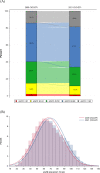Eligibility for pharmacological therapies in heart failure with reduced ejection fraction: implications of the new Chronic Kidney Disease Epidemiology Collaboration creatinine equation for estimating glomerular filtration rate
- PMID: 35199418
- PMCID: PMC9467854
- DOI: 10.1002/ejhf.2460
Eligibility for pharmacological therapies in heart failure with reduced ejection fraction: implications of the new Chronic Kidney Disease Epidemiology Collaboration creatinine equation for estimating glomerular filtration rate
Abstract
Aims: The new Chronic Kidney Disease Epidemiology Collaboration (CKD-EPI) equation for estimating glomerular filtration rate (eGFR), based on serum creatinine, that does not incorporate race may reclassify individuals, irrespective of race, from one eGFR category to another, with implications for eligibility for treatments in patients with heart failure and reduced ejection fraction (HFrEF).
Methods and results: A total of 43 138 ambulatory patients with HFrEF from 12 clinical trials were included (mean age 64.3 years; 9580 [22.2%] women). Mean eGFR was 67 (standard deviation [SD] 21) ml/min/1.73 m2 and 70 (SD 21) ml/min/1.73 m2 using the original and new CKD-EPI equations, respectively (mean difference 3.20 ml/min/1.73 m2 , 95% confidence interval [CI] 3.17-3.23, p < 0.001). Of the 935 patients with chronic kidney disease (CKD) stages 4 or 5, identified using the original equation, 309 (33.0%) were reclassified to CKD stages 1-3 (eGFR ≥30 ml/min/1.73 m2 ) with the new equation. However, the opposite was observed among the 2521 Black patients (5.8%) included, with a reduction in mean eGFR from 75 to 68 ml/min/1.73 m2 using the original and new equations, respectively (mean difference 6.94 ml/min/1.73 m2 , [95% CI 6.82-7.06], p < 0.001). The number of Black patients with an eGFR <30 ml/min/1.73 m2 increased from 49 (1.9%) using the original equation to 71 (2.8%) with the new equation.
Conclusions: The new CKD-EPI creatinine equation reclassified CKD stage in a large proportion of patients with HFrEF enrolled in clinical trials. As eGFR is an essential determinant of eligibility for several key pharmacological therapies in HFrEF, this reclassification could result in a substantial change in the proportion of patients considered eligible for such therapies and reduce the proportion of eligible Black patients.
© 2022 The Authors. European Journal of Heart Failure published by John Wiley & Sons Ltd on behalf of European Society of Cardiology.
Figures
Comment in
-
Tipping the scale toward a more accurate and equitable assessment of heart failure with reduced ejection fraction pharmacotherapy eligibility: a call to incorporate cystatin C in estimating glomerular filtration rate.Eur J Heart Fail. 2022 May;24(5):867-870. doi: 10.1002/ejhf.2505. Epub 2022 Apr 20. Eur J Heart Fail. 2022. PMID: 35415943 Free PMC article. No abstract available.
Similar articles
-
Prognostic impact of switching to the 2021 chronic kidney disease epidemiology collaboration creatinine-based equation in Caucasian patients with type 2 diabetes: the Renal Insufficiency and Cardiovascular events (RIACE) Italian Multicenter Study.Cardiovasc Diabetol. 2024 Oct 24;23(1):377. doi: 10.1186/s12933-024-02450-5. Cardiovasc Diabetol. 2024. PMID: 39449120 Free PMC article.
-
Effect of removing race from glomerular filtration rate-estimating equations on anticancer drug dosing and eligibility: a retrospective analysis of National Cancer Institute phase 1 clinical trial participants.Lancet Oncol. 2021 Sep;22(9):1333-1340. doi: 10.1016/S1470-2045(21)00377-6. Epub 2021 Aug 13. Lancet Oncol. 2021. PMID: 34399096 Free PMC article.
-
Evaluation of the CKD-EPI 2021 creatinine equation using laboratory data: Considerations for practice changes among clinical laboratories in British Columbia, Canada.Clin Biochem. 2024 Jan;123:110686. doi: 10.1016/j.clinbiochem.2023.110686. Epub 2023 Nov 20. Clin Biochem. 2024. PMID: 37992798
-
GFR estimation: from physiology to public health.Am J Kidney Dis. 2014 May;63(5):820-34. doi: 10.1053/j.ajkd.2013.12.006. Epub 2014 Jan 28. Am J Kidney Dis. 2014. PMID: 24485147 Free PMC article. Review.
-
Influence of Race Modifiers in Estimated Glomerular Filtration Rate Calculations on Medication Dosing, Access, and Transplant Eligibility.Clin Lab Med. 2024 Dec;44(4):705-717. doi: 10.1016/j.cll.2024.07.001. Epub 2024 Aug 16. Clin Lab Med. 2024. PMID: 39490126 Review.
Cited by
-
Tipping the scale toward a more accurate and equitable assessment of heart failure with reduced ejection fraction pharmacotherapy eligibility: a call to incorporate cystatin C in estimating glomerular filtration rate.Eur J Heart Fail. 2022 May;24(5):867-870. doi: 10.1002/ejhf.2505. Epub 2022 Apr 20. Eur J Heart Fail. 2022. PMID: 35415943 Free PMC article. No abstract available.
-
Causal relationship between polycystic ovary syndrome and chronic kidney disease: A Mendelian randomization study.Front Endocrinol (Lausanne). 2023 Mar 15;14:1120119. doi: 10.3389/fendo.2023.1120119. eCollection 2023. Front Endocrinol (Lausanne). 2023. PMID: 37008943 Free PMC article.
-
Estimating glomerular filtration rate with new equations: can one size ever fit all?Crit Rev Clin Lab Sci. 2023 Nov;60(7):549-559. doi: 10.1080/10408363.2023.2214812. Epub 2023 Jun 1. Crit Rev Clin Lab Sci. 2023. PMID: 37259709 Free PMC article. Review.
-
Prediction of cardiovascular events and all-cause mortality using race and race-free estimated glomerular filtration rate in African Americans: the Jackson Heart Study.Front Med (Lausanne). 2024 Oct 31;11:1432965. doi: 10.3389/fmed.2024.1432965. eCollection 2024. Front Med (Lausanne). 2024. PMID: 39544376 Free PMC article.
References
-
- The Kidney Disease: Improving Global Outcomes (KDIGO) . KDIGO 2012 Clinical practice guideline for the evaluation and management of chronic kidney disease. Kidney Int Suppl. 2013;3:1–150. - PubMed
-
- McDonagh TA, Metra M, Adamo M, Gardner RS, Baumbach A, Böhm M, et al. 2021 ESC Guidelines for the diagnosis and treatment of acute and chronic heart failure. Eur J Heart Fail. 2022;24:4–131. - PubMed
MeSH terms
Substances
LinkOut - more resources
Full Text Sources
Medical
Research Materials
Miscellaneous


